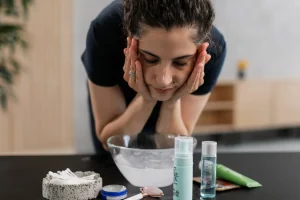Homemade Remedies and Natural Ingredients That Can Help Alleviate Acne
3 min read
Many homemade remedies for acne rely on ingredients that are found in food and plants. While some of them may help alleviate pimples, most do not have the backing of scientific research and can be harmful to your skin.
Manuka honey, derived from the leaves and bark of the New Zealand manuka tree, contains properties that can reduce inflammation. It also serves as a natural humectant, keeping skin moist.
Tea Tree Oil
Natural ingredients such as tea tree oil have anti-seborrheic properties, which help alleviate acne by inhibiting sebum secretion. They also have sterilizing properties that unclog pores and remove bacteria that cause inflammation.
To use tea tree oil, dilute a few drops with a carrier oil like coconut or jojoba. Apply to skin, as needed. Be careful when using tea tree oil, as it can be irritating if used in high concentrations, especially on damaged or sensitive skin. Always test a small amount of the product on your skin before applying it to larger areas or incorporating it into your skin care routine.
Tea tree oil can also be found in many over-the-counter skin products, such as gels and face masks. It’s a good idea to look for those with added ingredients, such as brightening mandelic acid, that can both knock out current pimples and prevent the appearance of dark marks. Also, look for those that are fragrance-free and paraben-free.
Multani Mitti
Multani mitti, also known as fuller’s earth, is a natural clay that has been used for centuries in beauty and skincare products. It has absorbing properties that can help improve skin texture and tone while fighting acne.
It helps cleanse the pores by removing excess oil, dirt, sweat and impurities. It is also able to absorb excess sebum and prevent blackheads and whiteheads from developing. It also helps fight the inflammatory action of acne and soothes the skin.
For acne-prone skin, you can mix multani mitti with neem powder and lemon juice to make a face pack. Apply this twice a week to fight the bacterial infection and excessive oiliness that leads to the formation of acne. The combination of neem and multani mitti can also lighten scars and marks left behind by acne. It is best suited for people with an oily skin type.
Chamomile
Chamomile is one of the best ingredients to help soothe skin. It has a combination of natural compounds like chamazulene, bisoprolol and apigenin that are known to reduce redness and skin irritation. It also has antiseptic properties which can be helpful in treating wounds and astringent qualities that can reduce acne spots. It is also known to help reduce hyperpigmentation in the skin and boost collagen production which can improve skin elasticity and tone. It is also an effective antioxidant and can help protect against oxidative damage.
It is available in a variety of forms, including as tea bags, liquid extracts, capsules and ointments. You can also add it to your beauty routine by applying it directly to the skin as a face mask or adding it to a homemade facial scrub. However, you should be careful when taking chamomile supplements as it can interact with certain medications. It is also important to avoid consuming it if you are allergic to asters, daisies, chrysanthemums or ragweed.
Aloe Vera
Aloe vera is a spiky green plant that can grow in poor soil and survive droughts because of special water-storing tissues within its leaves. This makes it a popular ingredient in many sunburn remedies and cosmetic products. It was also used by Cleopatra more than 2,000 years ago.
When applied topically, aloe vera can help alleviate acne breakouts because it has anti-inflammatory properties and helps reduce inflammation, says Morrow. “It’s also a great natural moisturizer and antimicrobial,” she adds.
You can use the nutrient-rich ingredient by mixing it with other dry ingredients such as kefir or coconut oil to create an exfoliant. When combining these two, it’s important to use an equal amount of each. These ingredients will fight bacteria, fungus and candida overgrowth on skin while unclogging pores. They’ll also provide an extra layer of moisture, helping combat acne-causing inflammation. You can also combine it with tea tree oil to treat a congested face and reduce redness.






